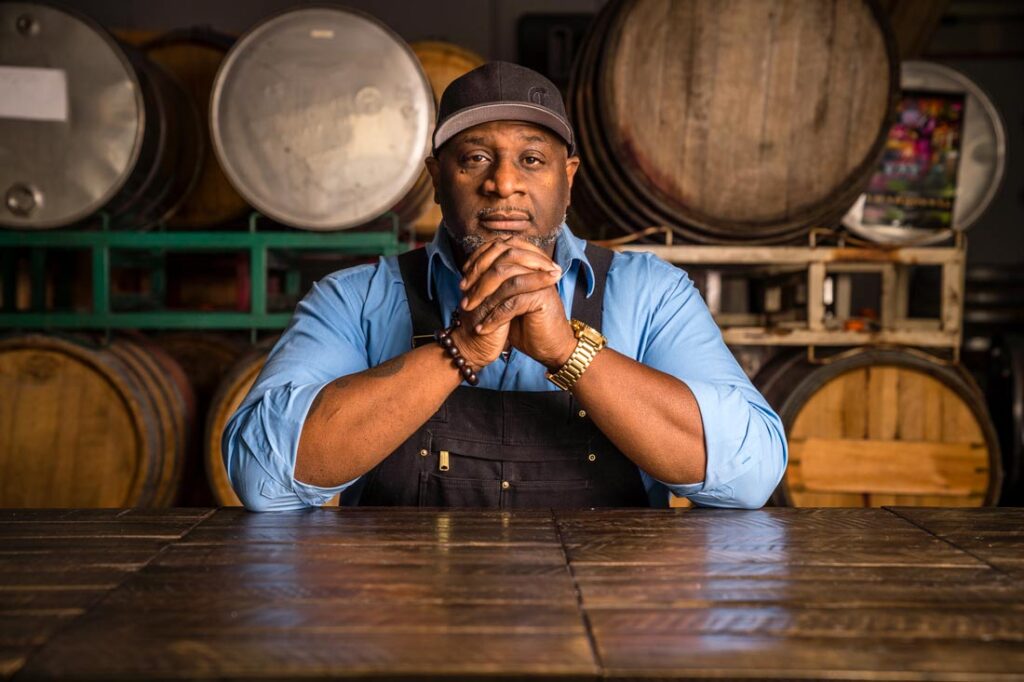This is not a story about wine.
However, it does feature 15 acres of grapes growing on 50 acres of land in the west hills of Portland, Oregon; two tasting rooms tucked into the borders of the famed Willamette Valley; and a farmer in Carhartt overalls driving a tractor through verdant fields.
Bertony Faustin, the man behind Abbey Creek Vineyard, is transforming the fruits of his labor into products that have both oenophiles and newbies scrambling to fill their glasses. But listen to him for just five minutes and you’ll realize his story goes beyond tannins or minerality.
Make your way into The Crick, the winery’s original property in the bucolic North Plains, and you might hear the gentle ripple of water flowing through the creek while gallons of macerating grapes slosh in barrels. Walk into his tasting room, The Crick PDX, and you might hear a curated selection of ’90s hip-hop spun by a DJ, laughter from the birthday party of a 70-year-old grandmother or engaged conversation between strangers. No matter which of Faustin’s spaces someone might discover, they all provide the same sensation: a profound sense of belonging.
Bridging two worlds
While the act of belonging makes no sound, its absence can feel as loud as a thunderstorm.
Coming from two vastly different cultures, Faustin knows that clamor by heart. His parents and two siblings came to Brooklyn, New York, from Haiti in 1969. Faustin and two other siblings were born in the United States.
“Growing up in New York in the ’80s, it wasn’t cool to be Haitian….” he recalls. “Haitians shunned you because you weren’t Haitian enough, and the American kids… shunned [you] because you were too Haitian. So we lived in this weird dichotomy mixed between two worlds and two lives.”
Faustin’s identity was further complicated by the fact that there were expectations around his career path.
“If you’re not a doctor, lawyer or engineer, you’re a failure to the family,” he shares. “[My parents’] lives were so difficult, and they had nothing, so in their minds, the only thing that would make you successful is these titles.”
Though he longed to rebel from these prescribed ideas, his guilt of never being enough led him to attempt a pre-med path, only to stop and start classes enough times to realize it was never going to happen. His compromise was to become an anesthesia technician, which allowed for flexibility in finding work in other cities. He had his sights set on California, but after a job took him to Oregon, he met his wife, started a family and planted what would become his first of many roots in the state.
Bertony Faustin finds his true calling
When his father unexpectedly died in 2007, Faustin experienced a profound shift—realizing that life was too short to be unfulfilled. And though he didn’t immediately know what would drive that fulfillment career-wise, he figured that using the resources already available to him would be a good place to start. His in-laws had 5 acres of grapes on their property in the west hills of Portland, and although he wasn’t a drinker, and knew next to nothing about the taste—or the making—of wine, he quit his job in anesthesia, bought their property and became a winemaker.
Though Faustin didn’t have a particular passion for wine, he did have a catalyst spurring him forward: his DNA. He knew if his parents could come to the U.S. without speaking the language or having a degree and could find success, then he could make wine.
He didn’t read how-to books or get any industry certifications, but he did attend a wine school in Salem, Oregon, for three months, dropping out after realizing he had something no one else in class did: grapes.
“Everyone in the program was interested and passionate about wine, and I was like, ‘Well, I got grapes,’” he laughs. “I was the only one in the class who actually had a vineyard.”
Abbey Creek Vineyard is born
Fifteen years later, he still has something many others don’t: a product people go out of their way to experience. His North Plains location differs from wineries in other parts of the state in that it’s very much off the beaten path, and you only end up there on purpose—the purpose, for most visitors, is Faustin himself.
It’s not difficult to understand why. His voice unfurls the way a cigar does—first with a larger-than-life expansiveness, filling the room and then dissolving into the fibers of your clothes such that the memory of its presence sticks with you long after you leave. He’ll spout profound, sometimes goosebump-inducing bits of wisdom that he’s learned along the way, which he imparts to his customers. Then, he’ll open his soul and invite you into vulnerable conversations, laying bare his struggles as a means of authentic connection.
He says his life has always been filled with darkness, pointing to moments of his youth where it was easiest not to get happy, “so you didn’t get sad.” This way of thinking, he says, where he failed to believe in anybody, also meant that he didn’t believe in himself. Today, he admits to owning his broken parts and not being afraid to be vulnerable about his experiences, as he believes it’s the shared experiences that connect us to each other.
“I finally understand that I am enough, and this last journey with the wine industry and everything that I do has allowed me to see some of that,” he says.
It’s Bertony Faustin who draws people in
The profundity of his message is the real elixir that brings people through his doors, because if you ask Faustin, wine is merely the delivery mechanism for something greater.
Take an experience he had at his Crick PDX location, which he says tends to draw more travelers and those attending conventions.
“One day, I had four Black women… come within 15 minutes of [each other],” he says.
The women told him they came because they heard about his story. Thirty minutes in, he watched them move to the same table and share their food with each other. Because of his influence and the platform he created, he was able to catalyze an experience like that for others.
He recalls another experience where three different groups came through his winery. When he asked how they got there and why, they all said it was because of him.
“I’m like, ‘Well, no, you came from Florida…. What else are you doing in town?’ and they’re like, ‘Nothing. We came because of you.’ And it still [messes] me up,” he admits. “But if I don’t at least acknowledge and try to celebrate or understand the influence I have on others, it’s almost a disservice to them.”
Creating spaces where people feel they belong is so important to Faustin that he’s willing to remove himself from a massively influential industry by speaking out about how systemic issues like institutionalized racism, colonialism and privilege obstruct minority winemakers from flourishing.
The Red, White and Black documentary
To shine a light on the disparities in the wine industry, he created his own production company to make the 2018 documentary Red, White and Black. The film details the challenges and successes of Oregon winemakers of color and in the LGBTQ+ community who have often been excluded from industry recognition.
In the film, Faustin shares that, “historically, in the U.S., a winemaker is a white male who has had privileged access and opportunity. Being a minority in any industry, you’re being looked at. Some days it rolls off your back, and other days it hurts.”
The hurt shows up when customers come into his tasting room, asking about the winemaker. When he tells them he’s the winemaker, he says he often gets confused looks.
“And then they’re like, ‘Well, you don’t have a vineyard, do you?’” he adds. “And I’m like, ‘Yeah. I’ve got a 50-acre property,’ and it was always, ‘Well, how?’”
The “how” is a question worth unpacking, as it speaks to the history of equitable distribution of land in this country.
The two sides of being Oregon’s first Black winemaker
The Oregon Donation Land Act of 1850, which gave white males and their wives 640 acres of land, explicitly excluded Black people from owning any land. In 1920, African Americans accounted for 14% of the nation’s farmers, yet today, that number has fallen to about 1%. When you dial it down further to Black-owned wineries, the number is less than 1% of the approximately 11,000 wineries in the U.S. In Oregon, the first recorded winery was in the 1850s, yet the first Black winemaker in the state was Faustin in 2008.
It’s a fact that changed the way Faustin shows up. Like, literally.
“The industry told me in 2008 that I was Oregon’s first Black winemaker,” he says. “I didn’t care; I wasn’t doing it for the industry. I didn’t do it for anyone.”
It was a title he didn’t publicly own until 2012, after recognizing the opportunity he had to create a platform that wasn’t dictated by anyone else’s rhetoric.
“We hear the term ‘token’ all of our lives,” he says, “but I finally decided that someone needs to see. And that’s the thing: I won’t be their token ever. I’ll be my token every day because I get to choose the value of that.”
A commitment to representation
Once Faustin embraced the limelight, he says he started seeing that the industry said he didn’t look the part. His solution? Show the industry who he truly was—a wine farmer who wears his overalls everywhere he goes.
“I wear overalls to black-tie events—with a button-down and tie… and you’d get this tuxedo guy who shows up and wants to know why,” he says. “And now I get to talk about representation without it being this tense subject.”
His commitment to authentic representation got him noticed by Carhartt, and he was invited to be a part of their 2018 #FriendsOfCarhartt campaign, which the company says celebrates “real, hard-working people and all the good things they do.” Faustin was featured across social media platforms, and his appearance in the company’s #ThankYou campaign about mentorship was aired live during college football games on ABC and ESPN.
“What I took away from that is showing up as you are every day,” he says, even when it doesn’t feel good. “Because we don’t get to choose who we influence; we get to choose how.”
How he influences is not unlike the way he makes wine: He lets it be. He believes nature is the best winemaker, and the grapes and yeast will do the important work. People, if given the right conditions, will do the same. This is what Faustin hopes for everyone who walks through his doors.
“One of the things I say all the time when people come to see us is, ‘You know how you walked into the door, but it’s up to me, how you leave,’” he says. “Now, imagine if not just businesses, but imagine if everybody who you ran into, you thought about that. You get to change or decide how they leave you. I think it would be a different world.”
This article originally appeared in the November/December 2023 issue of SUCCESS magazine. Photography by Dan Hawk/Courtesy of Bertony Faustin.




